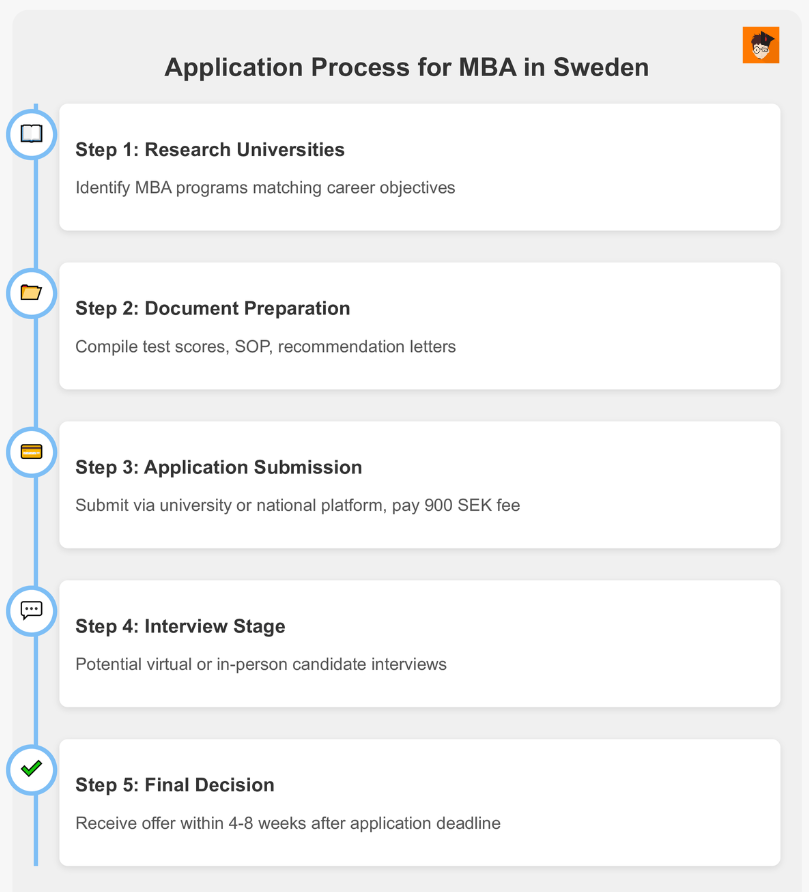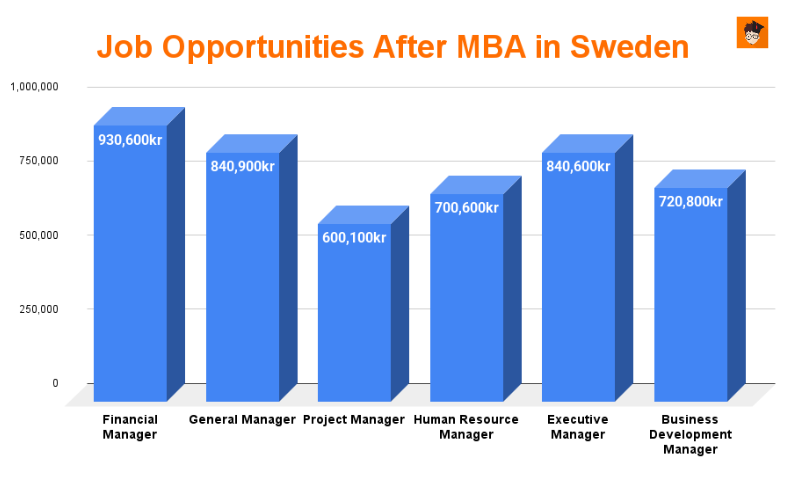Shahid Mustaq Murshed Study Abroad Content Specialist
Study Abroad Content Specialist
Sweden is a top destination for MBA aspirants, offering world-class education with a focus on innovation, sustainability, and global business strategies. In 2025, over 10,000 international students are expected to pursue MBA programs in Sweden, with institutions like Stockholm School of Economics, Lund University, and Uppsala University leading the way.
MBA in Sweden is a 1-2 year full-time course and is often regarded as a Master of Management. The average fees for an MBA in Sweden for Indian students range from 100,000 SEK to 400,000 SEK per year, depending on the university and program. You need a bachelor’s degree, a minimum of 3–5 years of professional work experience, and an IELTS score of 6.5 or above or a TOEFL score of 90+ to be eligible for Sweden MBA colleges.
After graduating from the best MBA colleges in Sweden, you can get a job with salaries averaging 606,000 SEK (47.82 lakhs INR) per year. Companies like Capgemini, IKEA, Ericsson, and Tetra Pak Inc hire MBA graduates in Sweden.
Top MBA Universities in Sweden
Here we have listed some of the best universities in Sweden for MBA along with their 2025 ranking and MBA fees.
| QS Ranking 2025 | Universities | MBA Fees |
|---|---|---|
| #74 | KTH Royal Institute of Technology | 360,000 |
| #75 | Lund University | 145,000 SEK |
| #103 | Uppsala University | 200,000 SEK |
| #128 | Stockholm University | 250,000 SEK |
| #139 | Chalmers University of Technology | 320,000 SEK |
| #194 | University of Gothenburg | 188,040 SEK |
| #304 | Linköping University | 177,600 SEK |
| #456 | Umea University | 193,200 SEK |
Cost of Living in Sweden
Apart from the tuition fees, you need to bear the annual living expenses in Sweden, which is around 10,584 SEK per month. The rent of accommodation takes up the major share of your expenses while living in Sweden which is around 3,500 SEK - 4,500 SEK per month followed by food, travel, utilities, and miscellaneous expenses.
Why Study an MBA in Sweden?
Check out the reasons why studying for an MBA in Sweden is a worthy investment.
- Top universities like Stockholm School of Economics and Lund University offer globally recognized MBA programs, frequently featured in the Financial Times rankings.
- Over 30% of students at Swedish universities are international, creating a diverse and global learning atmosphere. Sweden’s MBA programs attract students from more than 100 countries.
- Sweden has one of the lowest unemployment rates in Europe (8% in December 2024).
- Sweden offers a 6-month post-graduation work permit, allowing MBA graduates to gain valuable work experience in a business-friendly economy.
- Companies like Ericsson, Volvo, and Spotify actively recruit international talent, offering a variety of job opportunities.
- MBA fees in Sweden for international students range between 100,000 SEK and 400,000 SEK per year, which is competitive compared to other European countries.
- Sweden is a global leader in innovation, ranking 2nd in the Global Innovation Index 2024.
Explore: Study in Sweden
MBA in Sweden Admissions
Admission to an MBA program in Sweden is competitive, with top universities seeking candidates with strong academic, professional, and personal qualifications. Below are the key admission requirements and the application process for MBA programs in Sweden in 2025:
- Bachelor’s Degree: A recognized undergraduate degree in any discipline is mandatory. Most universities require a minimum GPA equivalent to 60% or above.
- Work Experience: 3-5 years of professional work experience is typically required for MBA programs. Leadership roles or managerial experience are highly preferred.
- English Proficiency: You must submit proof of English proficiency. Accepted tests include:
- IELTS: 6.5 or above
- TOEFL iBT: 90 or above
- PTE: 62 or above
- GMAT/GRE Scores (Optional for Some Universities): A GMAT score of 600+ or equivalent GRE scores can strengthen your application, though it is optional for some programs.
- Additional Documents:
- Statement of Purpose (SOP) for Sweden
- Letters of Recommendation (2-3, preferably from professional references)
- Updated Resume/CV
- Academic Transcripts
Know More: MBA Admissions in Sweden
Application Process for MBA in Sweden for International Students
Applications for MBA programs in Sweden generally open in October and close by January-March for the fall intake in Sweden. The application process for an MBA in Sweden for international students is as follows:
- Research universities to find the MBA program that aligns with your career goals.
- Gather required documents, including test scores, SOP, and recommendation letters.
- Apply through the university’s official portal or the Swedish national application platform
- Pay the application fee, typically around 900 SEK
- Shortlisted candidates may need to attend a virtual or in-person interview as part of the selection process.
- Offers are usually communicated within 4–8 weeks after the application deadline.

Scholarships for MBA in Sweden
MBA programs in Sweden can be expensive, and many students require financial assistance to cover their tuition fees and living expenses. Fortunately, there are several scholarships and financial aid options available to MBA students in Sweden. The following section shows the scholarships offered by the universities in Sweden:
| Scholarship | Awarded by | Eligibility | Award Value |
|---|---|---|---|
| SSE MBA Scholarship | Stockholm School of Economics | A Bachelor degree, a proven high level of English proficiency and a minimum of five years relevant work experience | Full tuition fee of SEK 645,000 + VAT |
| Lund University Global Scholarship | Lund University | Merit-based scholarship to students from outside the EU/EEA. | SEK 20 million each year. |
| KTH India Scholarship | KTH Royal Institute of Technology | Fee-paying student and have applied for a master's program at KTH as your first priority. You must also be an Indian citizen who has completed your undergraduate program in India. | Tuition fees for 2 years |
Job Opportunities After MBA in Sweden
After completing your MBA from Sweden, you can get exciting job opportunities. The average salaries of MBA graduates in Sweden are as follows:
- Entry-level MBA Graduate: 450,000–600,000 SEK per year
- Mid-level Professional (3–5 years of experience): 700,000–900,000 SEK per year
- Senior-Level Roles: 1,000,000+ SEK per year
Check out some of the popular job roles along with their salaries from the table below.
| Job Title | Average Annual Salary in SEK |
|---|---|
| Financial Manager | 930,600 |
| General Manager | 840,900 |
| Project Manager | 600,100 |
| Human Resource Manager | 700,600 |
| Executive Manager | 840,600 |
| Business Development Manager | 720,800 |

Note: Consider 1 SEK= 7.89 INR as of January 24, 2025
An MBA in Sweden is a smart choice for 2025. With top universities like Stockholm School of Economics and Lund University, affordable fees (100,000–400,000 SEK per year), and job opportunities at global companies like Ericsson and Volvo, it’s a great investment. Graduates can earn between 450,000 and 1,000,000 SEK annually, with a 6-month post-study work permit. Sweden’s focus on innovation and its welcoming policies make it a top destination for MBA students.
FAQs
Ques: Is an MBA in Sweden worth it?
Ans: Absolutely! Sweden offers globally recognized MBA programs focusing on innovation and sustainability. With top universities like Stockholm School of Economics and Lund University, competitive tuition fees, and excellent job opportunities, an MBA in Sweden is a valuable investment for your career.
Ques: How much does an MBA cost in Sweden?
Ans: An MBA in Sweden costs between 100,000 SEK and 400,000 SEK per year. The exact fee depends on the university and program, making it more affordable compared to many other European countries.
Ques: What is the scope of an MBA in Sweden?
Ans: The scope is excellent! MBA graduates in Sweden earn 450,000–1,000,000 SEK per year and work with top companies like IKEA, Ericsson, and Spotify. Sweden’s innovation-driven economy and 6-month post-graduation work permit further boost career prospects.







Comments